Interview: Wayne Gardner
SJ: How much does it cost to run a CEV team for a season?
WG: We started out with our own team and what I spent on our team with Remy was just as much as paying to get into a big team with a lot of experience and that can reduce the costs by spreading them out over several riders.
So you’re talking over 200,000 Euros a year to do eight races and testing. Which is an enormous amount of money, it works out to something like 30,000 Euros per event.
But the biggest problem is that to be competitive now you’ve got to have factory bikes. And the rules are so close to GP that they’re using last year’s factory Moto3 bikes in the Spanish Championship. Unfortunately they’re slugging the parents, or sponsors, heavily to participate, and that’s another challenge in itself.
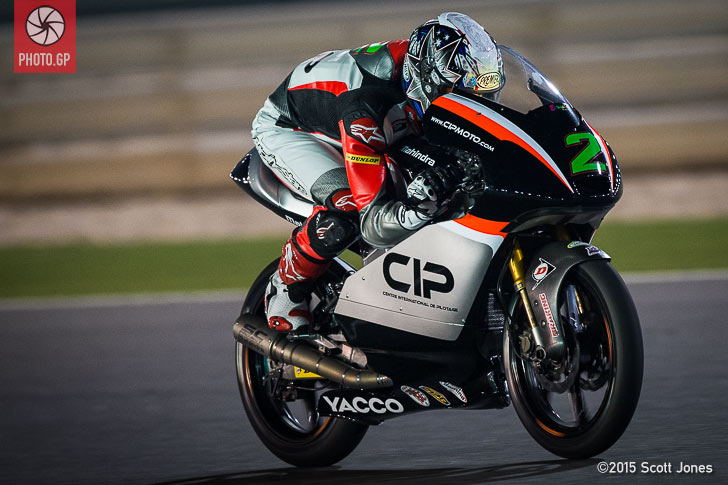
SJ: If an American or Australian rider wanted to come to GPs and ride on a competitive Moto3 team, how much would that cost?
WG: It depends on the quality of rider, you’d have to bring sponsorship with you, and you’re looking at between 250,000 up to, for the top level, factory everything, 700,000 Euros for a season.
It varies, of course. Obviously the better the rider you are, the less you’d pay. But if you come in with no name and you’re willing to pay the full freight for a top seat, I’ve been told €700,000.
That’s just one of the costs. There’s the cost of packing up and leaving Australia to live in Spain. You cannot travel back and forth. We did it at first and it nearly killed us. And that was only for six or seven rounds. So you actually have to live in Spain,and you have that enormous cost. But just to participate and buy your way onto a decent CEV team costs 200,000 Euros.
In GPs it’s actually less. Because how it works, I think, is that the teams get assistance from Dorna, via TV funding and things like that. However, it’s still extremely expensive. But you do get 18 GPs in a year.
What I’ve found, with Remy in particular – he’s got a lot of talent, and he’s grown very fast in the four years since he started road racing – but he didn’t have the experience. And so for us, the challenge was to stay in Spain and do the Spanish Championship, and hopefully win the championship, or, do you jump in here [Moto3] and chase the experience?
What I see with Remy is that he’s extremely fast but he doesn’t have the experience. So we decided to come into Moto3 because there’s better value for the money and he gains a lot of experience, which is what he needs.
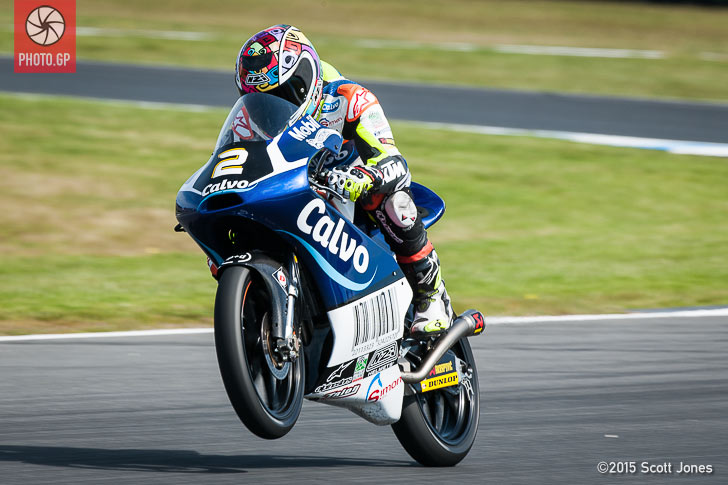 Remy Gardner’s Phillip Island wildcard
Remy Gardner’s Phillip Island wildcard
SJ: Was it difficult to find a spot for Remy in Moto3?
WG: Yes. It’s very difficult to find a spot. If I hadn’t gotten him into some wildcards last year, Phillip Island…
SJ: Misano?
WG: Well Misano came up because on of their [Kiefer Racing] riders was hurt so it was a bit of a last-minute fill in. It was good experience, but it wasn’t probably the best. Then I had to pay for the rest of the wildcards, the first being Phillip Island, where he did really well but unfortunately the bike stalled on the grid.
But luckily, for Remy, another rider was injured and [the Calvo Team] were looking for a replacement so they put Remy in there in Malaysia and he went out and got 15th place and got a point, So that was a pretty impressive thing.
And from there, it kind of springboarded him into people’s minds. Then there was a whole lot of musical saddles happening, and fortunately there was a seat available here [at CIP]. I got an email and a phone call from Alain [Alain Bronec, CIP Owner], and here we are.
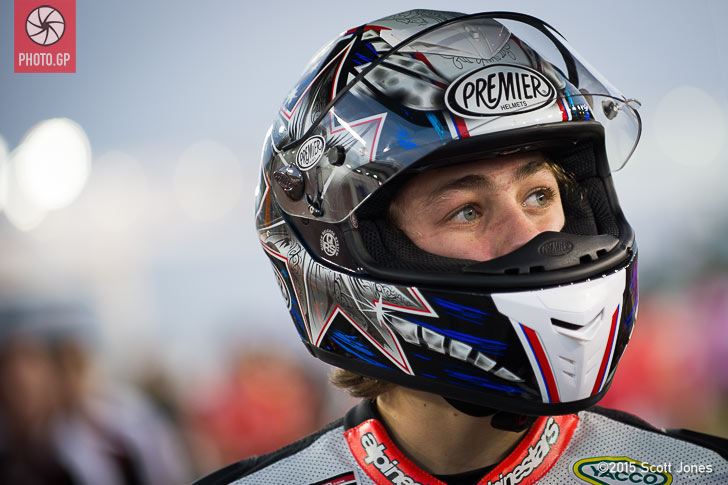
SJ: How much do you think it helps Remy that he’s Wayne Gardner’s son?
WG: I think it’s a disadvantage in many ways. I think that being the son of a world champion is a tough enough environment to work in given the expectations, for a start. Secondly everyone thinks that I, or other world champions, have enough money to pay for everything, and so we don’t need sponsors. And there’s an enormous amount of pressure on him because he should be doing as well as his dad. So overall I think it’s a disadvantage, if anything.
The advantage he does have is my knowledge and my contacts. However, I can’t ride the bike, all I can do is open the doors, and it’s up to him to go out and do the stuff. All I can do is give him advice and provide the opportunities. That’s about the only thing I really can do.
SJ: Remy has just turned 17. Does he listen to your advice?
WG: He’s very bright, he’s a very smart kid, and he does listen to my advice. He always has and he’s learned a lot from it. Yeah, he’s a good boy. He’s intelligent, he knows what he’s doing, he’s very, very talented. Whatever he puts his mind to he does extremely well. So now it’s just a case of going through the process and getting the experience to match his ability, and that’s what we’re doing this year. He’s never been here [Losail] before, and he’s in the top 20 already. So he’s doing a great job.
I feel more comfortable about him being in GPs than I did in the Spanish Championship. Because there you’re riding with a whole bunch of kids from 14 up to 20 odd years of age, who are desperate, trying too hard, and they’re throwing themselves down the road while riding above their abilities. There are a lot of crashes.
I’m always concerned for his safety, that’s the priority in everything. However, he’s now riding with a bunch of more professional riders and I feel a little but more relaxed and relieved that he’s got to his goal of riding GPs.
It has been bold move, and an expensive move, because obviously I’m paying for his ride this year. But I’m continuing to try to find sponsors and to pull my load along the way. But he’s doing a great job and I’m very proud of him.
If I didn’t think he could do it, I wouldn’t be paying up to this point in his career.
SJ: I asked Remy earlier about pressure to deliver in his first Moto3 season. Do you think he feels that pressure being put on him?
WG: No, I don’t think he feels the pressure, he’s just going out to do his thing. He’s a very committed and focused rider. He’s got his own drive inside, his own burning fire. I actually try to hose him down all the time, trying to calm him down. He gets frustrated when he’s not winning, or feels he’s not succeeding, I try to through the advice blanket over him and try to explain how things work, to think about the longevity and gaining experience. He puts enough pressure on himself without having anyone else do that.
So no, he’s self-driven. I don’t have to push him, as I said I try to hose him down, give him a cold shower every now and then, saying “Take it easy.” I’ve always got the brakes on and he’s always full gas. But I’m not bothered by that, because he very, very determined, but focussed and takes educated decisions on and off the track.
Our deepest thanks to Mr. Gardner and his son, Remy, for sharing their time and thoughts with us. You can follow Wayne Gardner on Twitter.
You can follow Remy on Twitter and Facebook.
Photographs: ©2015–2015 by Scott Jones / PHOTO.GP – All Rights Reserved
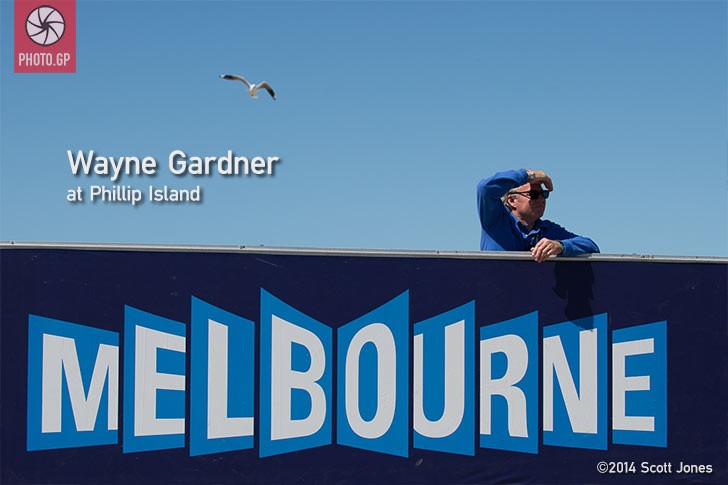





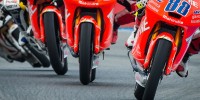



Please sign in or register to contribute a comment or question.